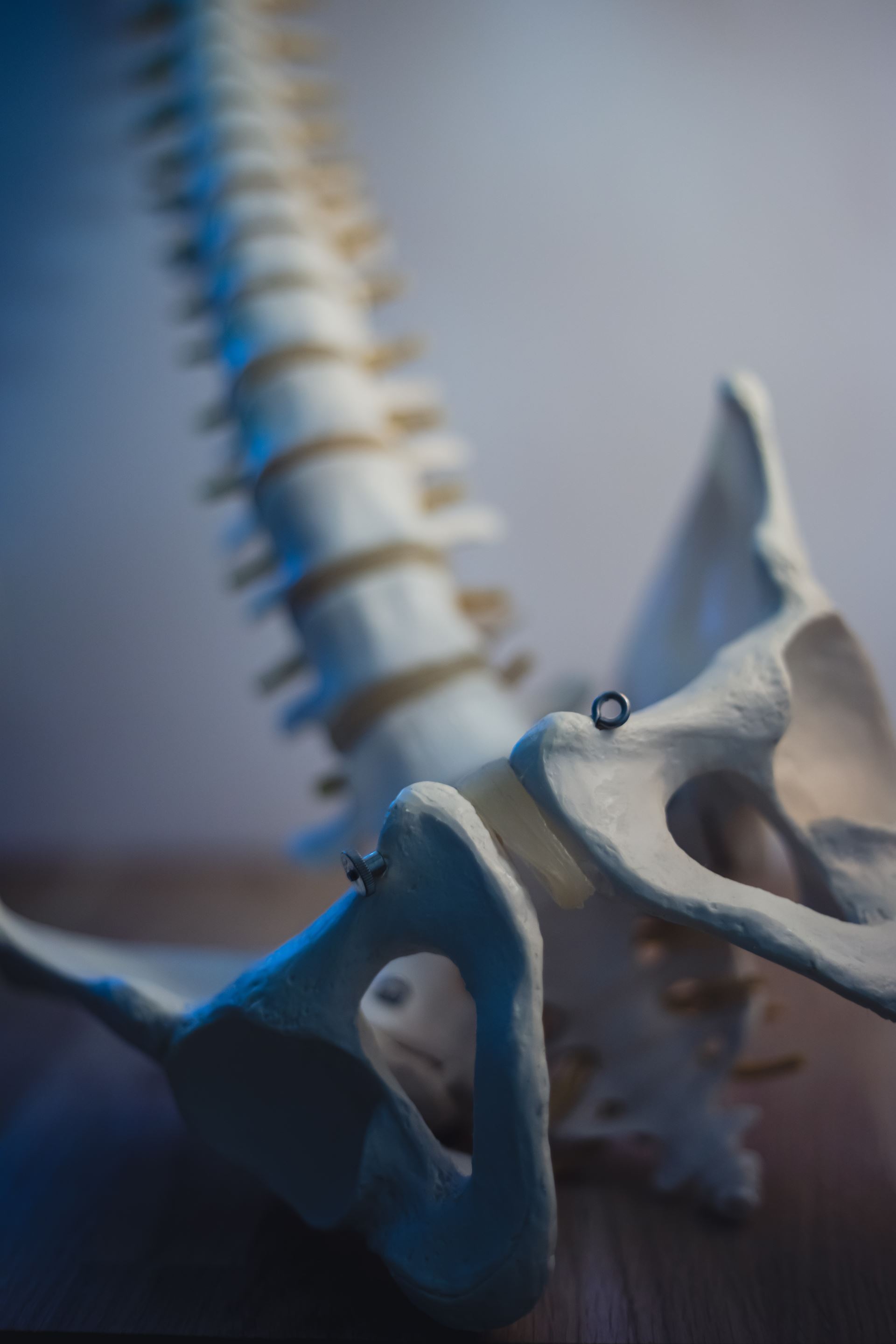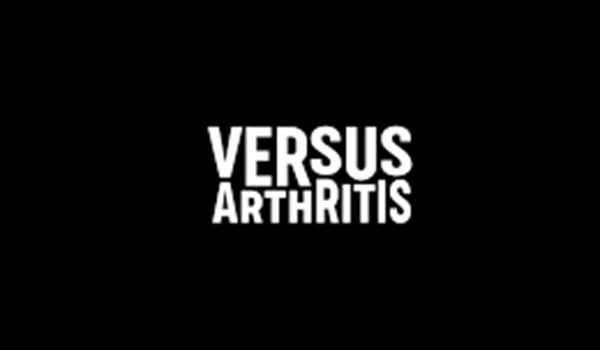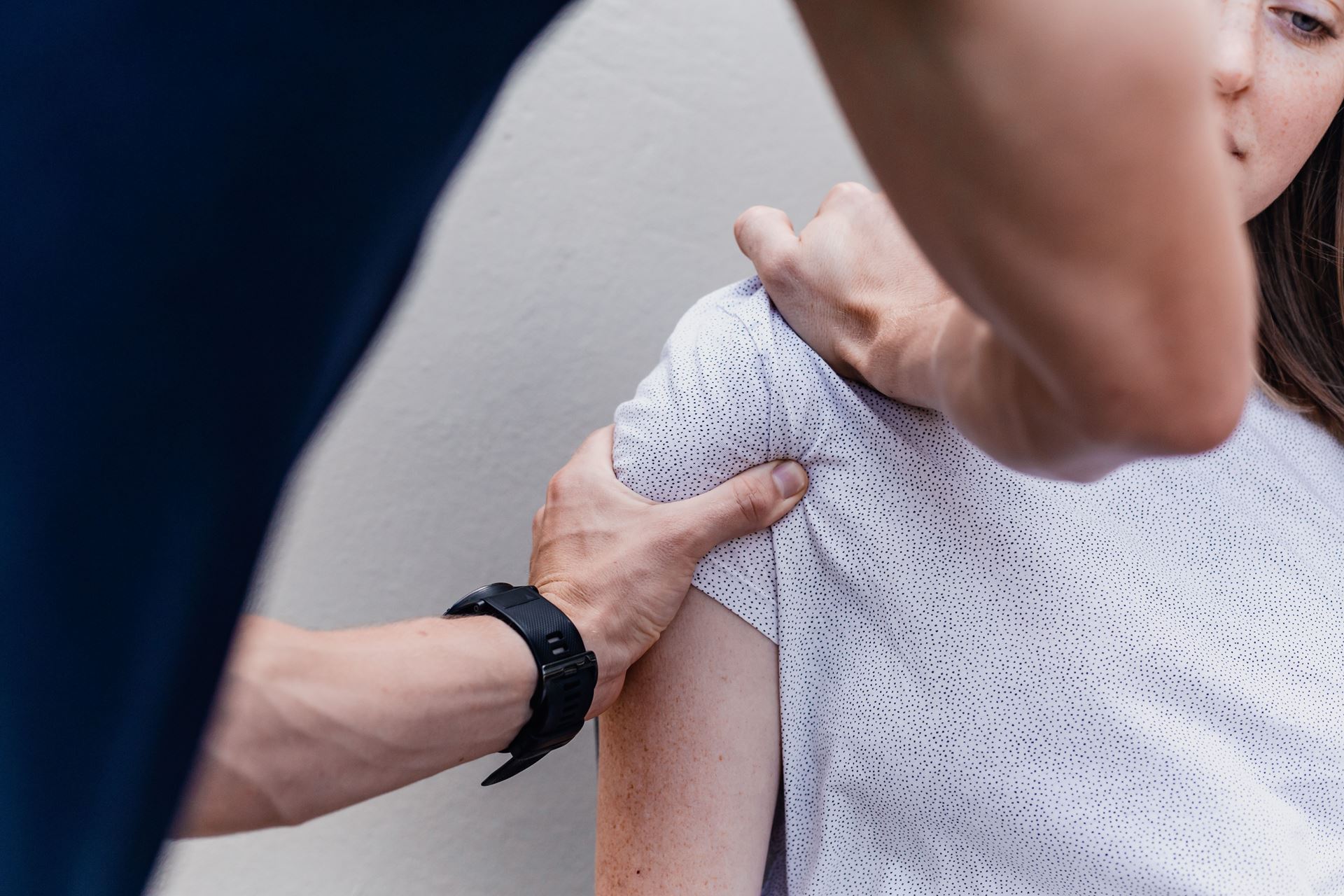Hip and Pelvis Issues
Hip pain is common presentation especially as we get older. It is important to say the causes of hip pain in children are very different compared to adults. This page concentrate on adult issues with hip pain.
This page includes brief description of some of the most common causes of hip pain and the way they commonly present. However, some of the conditions have overlaping symptoms. If you are unsure what is causing your hip pain, it is best to arrange a routine appointment to consult with one of our clinical team (physiotherapist, nurse practionner, physcian associate, GP). The link to Versus Arthritis also gives lots more information on the causes of hip pain and how to manage it.

Groin pain
Arthritis:
Osteoarthritis ('wear and tear arthritis') is the most common condition causing hip pain . It usually presents in people over 50 and can affect any joint but more commonly seen in the weight bearing joints like the hip, knee and ankle. Arthirtis sufferers complain of pain and stiffness in the groin that moves to the buttock or knee. The pain gradually gets worse over time and worse on weightbearing affecting walking. For more information on arthritis see the link below.
Impingement:
Impingement issues also known femoroacetabular impingement (FAI) is caused when over time extra bone grows in the hip joint which are commonly called bone spurs which can damage the articular surface of the joint.
The most common symptoms of FAI include pain, stiffness, limping
Pain often occurs in the groin area, although it may occur toward the outside of the hip. Turning, twisting, and squatting may cause a sharp, stabbing pain. Sometimes, the pain presents with a dull ache in the hip.
Giving way, locking, 'sharp-catching' symptoms.
Labrum Tear:
The labrum is the smooth cartilage that is found on the outer rim of the hip joint that lines the hip socket. It has an important role to keep the hip stable, maintain general balance and protect the cartilage within the joint.
When it is damaged or torn, it can cause symptoms of the hip locking, clicking or popping , and giving way.
The condition is also associated with dull pain in the groin, buttock or outside the hip. People often have had a history of playing sports regularly like golf , hockey , rugby and football.
Labrum tears also predispose to sufferers to developing hip arthritis in later years.
Lateral Hip Pain (pain in the side of the hip)
Lateral hip pain also known as greater trochanteric syndrome (GTS) -also known as gluteal tendinopathy/ trochanteric bursitis is a common self-limiting condition and resolves over weeks to months. Is often caused by the tendons from the buttock or quad muscles become injured from being overused and inflamed.
These conditions commonly cause pain in the side or posterior of the hip, pain can be worse moving from sitting to standing position, or climbing stairs or lying on the affected side. It can be quite a frustrating problem and recovery can take months in some case.
Treatment often requires pain relief, rest, physiotherapy support with stretches and exercises and sometimes a steroid injection. The latter can be performed from one of our GPs can help improve recovery if conservative maesures above are not working. See the link further down for more information.
Click here for exercise for gluteal tendinopthy
Posterior Hip/Buttock Pain
The below conditions can cause pain in the buttock:
- Gluteal /Hamstring tendinopathy:
- Piriformis syndrome
Both conditions can cause posterior / buttock pain on one side and triggered when trying to climb stairs and getting up from a standing position . Piriformis syndrome can cause the sciatic nerve to get pinched and cause shooting pain or numbness/tingling down the back of the leg on the affected side.
Both conditions usually resolve within 1-2 weeks with simple hip exercises , rest and pain relief. However, if the symptoms continue it may require physiotherapy assessment and targeted stretching.
The NHS Orthopaedic Hip Team
provide surgery and outpatient assessment clinics at the Royal Infirmary Hospital. They comprise of an experienced team of orthopaedic surgeons, nurse practionners, nurses and physiotherapists.
Access to their services requires an initial assessment by our clinical team at Bangholm Medical Centre and an onward referral. The team can offer surgical options for chronic common hip issues, acute traumatic injuries and sports injuries. For more information on the services they can provide please see their website : Edinburgh Orthopaedics
For more information specifically about hip replacements click here
Hip surgery is a major operation, and should be carefully considered before undertaking such a proceedure. There are a few important factors to consider before a referral to orthopaedics is made:
1: Is it necessary? Most hip issues can be assessed and pain managed with our clinical team at Bangholm and exercises and rehabilitation with our community physiotherapists. Referral to orthopaedic is appropriate if these measures dont help and pain is increasingly and persistently severe. see the link to physiotherapy support below.
2: Are you fit enough to undergo the surgery? Our orthopaedic colleagues have advised us that your fitness rather than simply age to undergo a hip operation is the most important factor to determine if it is to be a success. Also post-operative recovery can take 8-12 weeks. The team have emphasised to us that patients with a BMI of over 40 have very high risk of post-operative complications and recommend the need to lose weight before being referred to the service.
3: How long is the waiting time to be seen in an NHS orthopaedic clinic? Current NHS waiting times for a routine appointment are over a year. Alternative private options are available and have much lower waiting times of around few weeks. However, the overall cost of the intial assessment and subsequent proceedure are very high. Also, routes to direct transfer to the NHS operative waiting list after a private orthopaedic assessment are not possible. In this scenario, our orthopaedic colleagues have stressed , you would need to be re-referred back for a repeat initial assessment with the NHS team.
Page created: 04 September 2020








